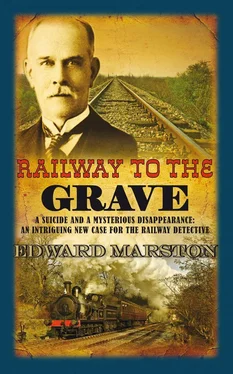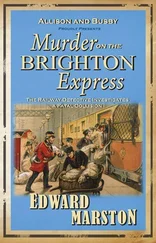Edward Marston - Railway to the Grave
Здесь есть возможность читать онлайн «Edward Marston - Railway to the Grave» весь текст электронной книги совершенно бесплатно (целиком полную версию без сокращений). В некоторых случаях можно слушать аудио, скачать через торрент в формате fb2 и присутствует краткое содержание. Жанр: Исторический детектив, на английском языке. Описание произведения, (предисловие) а так же отзывы посетителей доступны на портале библиотеки ЛибКат.
- Название:Railway to the Grave
- Автор:
- Жанр:
- Год:неизвестен
- ISBN:нет данных
- Рейтинг книги:5 / 5. Голосов: 1
-
Избранное:Добавить в избранное
- Отзывы:
-
Ваша оценка:
- 100
- 1
- 2
- 3
- 4
- 5
Railway to the Grave: краткое содержание, описание и аннотация
Предлагаем к чтению аннотацию, описание, краткое содержание или предисловие (зависит от того, что написал сам автор книги «Railway to the Grave»). Если вы не нашли необходимую информацию о книге — напишите в комментариях, мы постараемся отыскать её.
Railway to the Grave — читать онлайн бесплатно полную книгу (весь текст) целиком
Ниже представлен текст книги, разбитый по страницам. Система сохранения места последней прочитанной страницы, позволяет с удобством читать онлайн бесплатно книгу «Railway to the Grave», без необходимости каждый раз заново искать на чём Вы остановились. Поставьте закладку, и сможете в любой момент перейти на страницу, на которой закончили чтение.
Интервал:
Закладка:
‘The strain is too much for him,’ decided Leeming.
‘He’ll rally when it’s his turn,’ said Colbeck.
‘What if he collapses?’
‘That won’t happen, Victor. If anyone is going to feel faint, it will be one of the ladies.’
‘Then it will be the colonel’s daughter. She seems to be such a delicate creature.’
‘What do you make of her brother?’
‘He looks as if he’d rather be playing billiards somewhere.’
‘That was my impression. He’s a denizen of gentlemen’s clubs and drinking establishments, I fancy.’ He glanced around. ‘Keep your eyes peeled, Victor.’
‘What am I looking for, Inspector?’
‘A murder suspect – he’s here.’
Though he looked senile and doddery, the coroner turned out to be brisk and efficient. When he rose from behind the table to declare that the court was in session, the hubbub died immediately. In clear and concise detail, the coroner explained the procedure and reminded everyone that they were simply there to reach a verdict about the death by his own hand of Colonel Aubrey Redvers Martin Tarleton. The first witness was sworn in and the searching questions began.
Margery Withers came first, telling them how the colonel had behaved in the wake of his wife’s disappearance and insisting that he appeared to be his usual self on the day of his suicide. Her testimony was interspersed with tears. Lottie Pearl was too recent an employee to have built up any emotional ties with the colonel and his wife so her comments – though delivered in a quaking voice – were more objective. She agreed that there had been no sign at all of what the colonel had in mind when he left the house for the last time.
The same story was repeated time and again by those whom he’d passed in the village on his way to commit suicide. Dorcas Skelton, the rector’s wife, a plain, pallid, roly-poly woman with a tendency to sniff at the end of each sentence, took her turn.
‘Did you encounter the colonel that day?’ asked the coroner.
‘I did, sir,’ she answered.
‘At what time would that be, Mrs Skelton?’
‘It was nearly eleven o’clock in the morning.’
‘Did any words pass between you?’
‘None at all,’ she said. ‘The colonel simply tipped his hat to me and smiled. In view of my feelings about the fate of his wife, I was unable to acknowledge his smile.’
‘The fate of Mrs Tarleton is immaterial,’ said the coroner, quelling the heavy murmur that arose. ‘We are here simply to make a judgement in respect of her husband. Did you notice anything at all unusual about him that morning?’
‘I did not, sir.’
‘You’d consider him to be of sound mind, then?’
‘Yes, I would – indubitably.’
‘Thank you, Mrs Skelton.’
Peeved that her testimony had been so short, she returned to a seat beside her husband who patted her hand in approval of her performance. Others came forward in succession until Tallis’s name was eventually called. Leeming’s fears were groundless. As Colbeck had predicted, the superintendent straightened his shoulders and set his jaw as he stood before the coroner. The fact that he had a faint resemblance to the deceased caused a ripple of interest. Nobody was surprised when they heard that he served many years in the army.
‘When did you last see your friend?’ asked the coroner.
‘I’m ashamed to say that it was some time ago,’ replied Tallis. ‘My work precludes any travelling for pleasure.’
‘Could you be more precise, Superintendent?’
‘It was five and a half years ago – just before the rector came to the village. The last service I attended at the church was taken by his predecessor, Canon Jermyn. However,’ he went on, ‘the colonel and I remained in constant touch by letter. I was his confidant.’
‘May we hear what he said to you in his farewell missive?’
Tallis was uneasy at having to read a private message in such a public place but he spoke the words aloud. Mrs Withers was moved to tears and had to be consoled by Eve Doel. Others, too, were affected by the poignancy of the letter. Some, however, were immune to its implications. Frederick Skelton pursed his lips in disdain, Sergeant Hepworth, standing at the back of the room, gave a wry grin and Adam Tarleton had to put a hand over his mouth to suppress a snigger. As the witnesses continued to have their fleeting moment under oath, Colbeck was concerned that the verdict had already been reached. It seemed like a foregone conclusion. Everyone had testified that the deceased had been in full possession of his faculties during the period before he committed suicide.
Suddenly, it all changed. Eve Doel, who spoke of her stepfather with affection, recalled the visit she and her husband had made to the house immediately after her mother had been reported missing. During a long conversation that went on into the night, the colonel had made some strange remarks which, in retrospect, had been indications that he was considering suicide. At the time, she hadn’t recognised them as such. She blamed herself for not staying with him at the house to offer support but she’d been so overwrought at her mother’s disappearance that her husband insisted on taking her home and seeking medical help for her. When Eve finished her testimony, she returned unsteadily to her seat.
Bertram Reader told of the intense pressures under which the colonel had been and he remembered a time when his friend had been so distracted that he’d driven to Northallerton in the middle of the night to bang on their door and to ask if his wife was still there. Agnes Reader later endorsed the statement and, between sobs, told of other occasions when the strain had taken its toll on the colonel. But it was the evidence of the family doctor that was really crucial. Slowly and with some reluctance, he described the colonel’s inability to sleep and of his wild request for a venomous poison that he could take to end his agony. There were several instances of worrying conduct by the colonel, culminating in a frightening incident when he accused the doctor of murdering his wife and tried to attack him.
While the whole room was roused by these revelations, the coroner treated them dispassionately. Adjusting his pince-nez, he sought to get a definitive medical opinion.
‘Did you see signs of mental instability?’ he asked.
‘I did, sir,’ said the doctor, ‘and they were unmistakable.’
‘Was there any deterioration in his condition?’
‘After the disappearance of his wife, the colonel consulted me four times in a row. Each time, there was a slight deterioration in his state of mind. He could keep it from less discerning eyes but not from mine.’
‘Do you believe he was unbalanced when he took his own life?’
The doctor was unequivocal. ‘I’d stake my reputation on it.’
There was a mild uproar and it had to be subdued before the coroner could make his voice heard. The court was adjourned while the jury retired to consider their verdict. Most people dispersed in search of fresh air, ready to return in due course when they were called to hear the verdict.
Colbeck’s only concern was for the health of the superintendent. Tallis was still reeling from the doctor’s opinion, refusing to accept that his friend’s mind had finally crumbled. Colbeck was firm.
‘This has taxed you too much, sir,’ he said. ‘I think that you should return to the village on the next train and try to get some rest. I’ll stay here to await the verdict.’
Tallis shook his head. ‘I’m not running away now.’
‘It could take hours before they reach a decision. There’s no point in lingering here for that long. The sergeant will see that you get back safely to the Black Bull.’
Читать дальшеИнтервал:
Закладка:
Похожие книги на «Railway to the Grave»
Представляем Вашему вниманию похожие книги на «Railway to the Grave» списком для выбора. Мы отобрали схожую по названию и смыслу литературу в надежде предоставить читателям больше вариантов отыскать новые, интересные, ещё непрочитанные произведения.
Обсуждение, отзывы о книге «Railway to the Grave» и просто собственные мнения читателей. Оставьте ваши комментарии, напишите, что Вы думаете о произведении, его смысле или главных героях. Укажите что конкретно понравилось, а что нет, и почему Вы так считаете.












